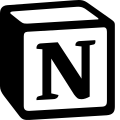History
Notion Labs, Inc. was created as a startup in San Francisco, California, founded in 2013 by Ivan Zhao, Chris Prucha, Jessica Lam, Simon Last, and Toby Schachman. [7]
In August 2016, Notion 1.0 was released, followed by Notion 2.0 in March 2018. At that point, the company had fewer than 10 employees. [8]
In September 2019, the company announced it had reached 1 million users. [9]
In January 2020, Notion raised $50 million from Index Ventures and others, valuing the company at $2 billion. [9]
In October 2021, a new round of funding led by Coatue Management and Sequoia Capital helped Notion raise $275 million. The investment valued Notion at $10 billion, and the company had 20 million users. [10]
In February 2023, Notion released the "Notion AI" service that can be used on the workspace, [11] and later added an AI feature allowing users to query an AI chatbot, and receive answers based on information stored in their workspace.
In September 2024, the company announced it had reached 100 million users. [12]
In April 2025 they released Notion Mail, a Gmail-based email client with Notion AI integration, intended to assist users draft replies, schedule meetings, and search across messages . [13]
In April 2025, Notion was featured in the Forbes AI 50 list. [14]
This page is based on this
Wikipedia article Text is available under the
CC BY-SA 4.0 license; additional terms may apply.
Images, videos and audio are available under their respective licenses.
